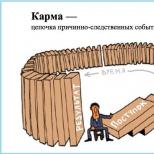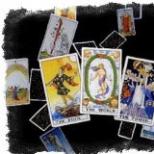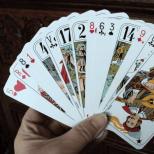Questionnaire for parents teaching children through the game. Questionnaire for parents on the topic "didactic games", "flora" material on the topic
Dear parents!
We ask you to participate in the study. Please tick the answer options that match your point of view.
1. Does your child often play at home?
your choice _______________
2. How much time per day does your child play alone?
less than 1 hour
1 to 2 hours
your own version
3. Do you play with your child? yes no rarely
4. How often do you offer a child a new game plot for him or does he offer it himself?
I offer as needed.
Chooses independently
Your choice ________________
5. Where do you think the child's play stories come from?
from kindergarten games
television and computer games
your own version of _________________
6. What games does your child play most often?
mobile
desktop
role-playing (Daughters-mothers, Voynushka, Shop, etc.)
your choice ___________________________
7. What roles do you play in games?
8. Do you offer your child to play a specific game?
9. Do you insist on choosing a game if he does not express a particular desire?
your choice ___________________________
10. How do you choose games for your child?
At your own discretion
At the discretion of the child
11. What, in your opinion, the psychological qualities of the child develops the game?
12. Do you need advice on the management of role-playing games? Thank you for your cooperation!
Appendix 16
long term plan organizing a role-playing game
February
A week
Reading S. Kaputikyan "Masha is having lunch"
Lesson "My family" (consideration family photos, plot pictures on the theme "Family is having lunch", pictures with the image of a family)
The game "Let's treat the doll with tea"
Parent survey
A week
Ethical Conversations"How to behave at a party"
Didactic game: "Let's tell the bear how to welcome guests"
Conversation with children about their families, drawing on the theme "My family"
Joint game with the teacher "Birthday of the Vari doll"
A week
Lesson "My family"
Board educational game "Family"
Role-playing game "Family (guests)".
Parent meeting"How to play with children"
A week
Occupation " Different professions»
Cognitive lotto game “Who needs what for work? »
Didactic game "Who and what does with these objects?"
March
A week
Reading of works: "Doctor Aibolit" by K. Chukovsky, "The rooster fell ill with a sore throat" by A. Krylov
A conversation about the profession of a doctor, a nurse, looking at illustrations from the series "Professions": "Doctor", "Nurse".
Didactic game “Who forgot their things”, “Who needs what for work?”
The game together with the teacher "Doctor Aibolit"
A week
Reading A. Kardashov "Katya is sick"
Conversation with children "How my mother and I went to see a doctor"
Excursion to the medical office of the kindergarten
Didactic game "We treat the doll"
A week
Introduction of the "Doctor Aibolit" set. Acquaintance with the attributes: stethoscope, thermometer, syringes, vitamins, spatulas.
Role-playing game "The doll got sick", doctor - educator.
A week
Independent role-playing game"At the doctor"
Speech at the kindergarten teachers' council "Organization of role-playing games with children 3-4 years old"
April
A week
Reading works: nursery rhymes “Grow a braid to the waist”, L. Razumova “Hairdresser”, a cycle of poems for children N. Samony “I want to be a hairdresser!”.
Conversation "Why do we need a hairdresser?"
Consideration of illustrative material on the topic.
The teacher's story "How I went to the hairdresser"
A week
Mom is a hairdresser visiting us.
Acquaintance with the items necessary for the work of a hairdresser
Examining an album with samples of hairstyles: men's, women's and children's.
The game "Let's make a hairstyle for the Masha doll"
A week
Drawing "How I went with my mother to the hairdresser"
D / game "Show the doll how the hairdresser works"
Game with the teacher "Fashionable hairstyle"
A week
Independent role-playing game "Barbershop"
Appendix 17
06.04.2013 4985 0Questionnaire for parents "What and how do children play at home"
Target: to get some idea of the attitude of the parents of pupils to the use of the game in communicating with the child at home.
Dear parent! We ask you to take part in a questionnaire survey regarding the play practice of the child at home. Answer as broadly as possible; write, if necessary, on the back of the sheet. Signature is not required.
- Opposite points of view are expressed on children's play. One is an optional, sometimes empty pastime for pleasure; another - game - vital necessary condition for the development and maturation of the child, contributes to the preparation for school life. Choose one of the points of view that you share, or formulate your own.__________________________________________________
2. Does your child like to play: yes, no, it's hard to say (underline as appropriate). What is his favorite game or what does he most often play?____________
3. What types of toys does the child have at home: figurative (animals, dolls, including Barbie, Cindy); household (furniture, dishes, etc.); technical (cars, locomotives, etc.); building sets, constructors, Lego sets; musical toys; clockwork (yule, etc.); didactic (cubes, pyramids, inserts, etc.); desktop-printed (lotto, etc.); game sets for story games(to a store, hairdresser, hospital, etc.); electronic toys (tamago, etc.); computer toys; monster toys; military toys (machine guns, pistols, tanks, etc.) (underline as appropriate, add if necessary)? ______________________________________________________
4. Express your attitude to toys that are sold in stores and stalls.________________
5. What are you guided by when buying toys for a child: take into account the playing interests of the son (daughter), the gender of the child, the price of the toy, the developing effect of the toy, its moral orientation (underline as appropriate, add if necessary)? ______________________
6. Please remember what you played as a child? ____________
Who did you play with during your preschool years?____________________
You can say to yourself that you played enough as a child: yes, no, I don’t remember (underline as appropriate)?
7. Do you like to watch adult TV games: yes, no, it's hard to say (underline as appropriate)? Name what you watch with interest and pleasure?____________________
8. Do you think there is a difference between why adults play and why children play? If yes, what is the difference? _____________________________
9. What do you think it means to be a child's play partner? ___________
10. Does your child happen to be a participant in collective games with peers in the country, in the yard, in the apartment; with you on your day off (underline as appropriate, add if necessary)? _____________
11. Does the child ask you to play with him: yes, no, it's hard to say (underline as appropriate)? How do you respond to these requests?__________
What roles does the child offer you by inviting you to the game? ____________
12. What kind of game, in your opinion, brings the child more benefit: when he plays enthusiastically alone; when participating in a collective game with other children or with an adult; both are equally useful (justify your choice)? ______________________________________________________________
13. Express your agreement or disagreement with the phrase: "The game will not lead to good", in the sense that you yourself are ready to attribute to it: "yes, that's right"; "no, it's not"; formulate your own answer.____________________
Thank you for your cooperation!
Data processing.
The percentage weight of the underlined answers from the proposed options is calculated, based on their analysis, assumptions are made, and prospects for cooperation are outlined.
Ludmila Karepova
Questionnaire for parents "Play with children"
QUESTIONNAIRE FOR PARENTS
« WE PLAY TOGETHER WITH CHILDREN»
Dear parents!
aim questionnaires is a generalization and consolidation of ideas about the game of children as the leading form of activity in preschool age. It will also help you understand that you are the same active participants. pedagogical process like your children and teachers. This questionnaire will help you and us to understand how much you can play and communicate with your child. The questionnaire is anonymous but very important to us. Mark with circles and write where necessary.
1. What is the game, in your opinion?
The game- this is a type of unproductive activity, the motive of which lies not in its results, but in the process itself.
The game is an activity designed for recreation and fun.
The game is the main activity, development and training.
2. What games are you were playing as a child and taught them to your child?
catch-up
Lego, constructor
Other games
….….….….….….….….….….…. ….….….….….….….….….
3. playing Are you at home with your child?
4. Does the child have favorite toys among toys?
What are these toys?
. …. …. …. …. …. …. …. …. …. …. …
. …. …. …. …. …. …. …. …. ….….
5. Do you allow play child in some interesting games for him, but which you do not like?
6. What games do you play more often play with a child?
Outdoor games
Educational games
Didactic games
word games
Story games
finger games
7. How do you choose games for your child?
At your own discretion
At the discretion of the child
….….…. ….…. …. …. …. …. …. …. …. ….
Thank you for your answers!
Teacher: Karepova L. Yu.
Related publications:
During Health Week in our kindergarten there was a checkers tournament among senior preschoolers. For the first time this year in the nursery.
“We play, we play - we develop a beautiful speech!” Advice for parents The speech development of a child is one of the most important indicators of his harmonious progress. The first word of a baby is an occasion for a great one.
Questionnaire for parents to determine areas of correctional work with children QUESTIONNAIRE FOR PARENTS (abbreviated) Dear parents! Completing this questionnaire will help in identifying the right directions corrective work.
Play together. (Tips for parents) Children's questions reflect their special vision of the world, range of interests, type of temperament and character. In no case do not dismiss children.
Advice for parents "Play with children" Parents know that children love to play, encourage them to play independently.
Consultation for parents “The game in the life of a child. We play together with the child"Don't interfere! Go play!" How often do parents say this phrase? Parents today know that younger children preschool age.
 As always before New Year holidays a competition for the best crafts on the theme of New Year's fantasy is announced. And as always choose the best.
As always before New Year holidays a competition for the best crafts on the theme of New Year's fantasy is announced. And as always choose the best.
Scenario of sports entertainment for children and parents "We play together - we strengthen the back" Tasks: To promote the acquisition of experience in the motor activity of children; contribute to the proper formation of the musculoskeletal system.
Tatyana Reutova
Questionnaire for parents "Organization gaming activity with a child at home
Questionnaire for parents
Dear parents, read the question and mark the appropriate answer, if the proposed options do not satisfy you, enter your answer.
1. How often do you child playing at home?
B) your choice
2. What toys does your child most often?
BUT) board games, puzzles, lotto
B) Dolls, cars
In computer games
D) your choice
3. Do you allow to kid play some Interesting games for him that you don't like?
B) your choice
4. How much time per day is your child playing alone?
A) less than an hour
B) From 1 to 2
B) your choice
5. How much time per day do you play with child?
A) 15 minutes
b) about an hour
B) your choice
6. How often do you offer child a new plot of the game or does he propose?
A) I offer, as needed
b) he offers
B) your choice
7. Organized whether especially in your family child activity?
A) Reading together, walking in nature, teaching manual skills
B) We play educational games, organize sports activities
In our independent child finds his own business
D) We do not specifically deal with children, we involve them in what we do ourselves
D) your choice
8. What family traditions are observed in your family?
A) birthdays of family members
B) Collective visits to cinemas, theaters, museums, etc.
D) Family Day, Sundays family dinners (dinners)
D) Making photo albums, holding family councils
E) your choice
9. Do you watch children play together? Do you help build relationships between children?
C) I don’t attach any importance to this, let them figure it out themselves
D) your choice
Thank you for your participation! -
Related publications:
Organization of play activities with children 2–3 years old The game is the leading type of activity of the preschool child, which determines his future mental development, primarily because the game is inherent.
The leading activity of preschool children is the game. With proper organization, the game creates conditions for the development of physical,.
Questionnaire for educators "Organization of theatrical activities in preschool educational institutions" Questionnaire for educators "Organization of theatrical activities in preschool educational institutions" 1. What does the term "staging" mean? What value is it used for.
 Topic: "A bunny visiting children" Purpose: To create conditions for joint musical, artistic, aesthetic and motor activities.
Topic: "A bunny visiting children" Purpose: To create conditions for joint musical, artistic, aesthetic and motor activities.
Research project "Organization of gaming activities in preschool educational institutions" The game is one of the leading activities of the child in preschool childhood. In the game, the child himself seeks to learn what he does not know yet.
Consultation for parents "What to play with the child at home" (5-7 years) Games for the development of memory. “Remember the objects”, “Remember the words”. Learn to memorize and reproduce information. "Detective".
Advice for parents "Hello, autumn!" (games with a child at home) Autumn is on the threshold again, with its rains, wind, puddles underfoot, slush. But autumn is not the time for sadness, even in bad weather you can spend it.
"Creating conditions for gaming activities in the family"
Questionnaire for parents
1. Does the child have a separate room (a corner where they can play and store their toys)?
c) partially
2. What does your child prefer?
a) watching cartoons and TV shows
b) active games (mobile)
c) educational and educational games
d) reading fiction
e) computer games.
3. How often and for what reason do you buy toys for your child?
a) as a gift on special occasions
b) often at the request of the child
c) rarely, if funds are available.
4. What kind of toy do you prefer to buy?
a) dolls or cars
b) educational games (table-printed games, constructors, etc.)
c) soft toy
d) toys that imitate military actions
5. Does your child often break toys?
a) very rarely
b) sometimes
c) constantly
6. How do you feel about broken toys and torn books?
a) repair
b) ignore
c) throw away.
7. Paper, plasticine, paints are always available to my child
c) sometimes
8. Does the child have play equipment for physical development: (underline as appropriate)
A) sports area
B) ball, rope, hoop, darts
C) other sports equipment (skis, skates, etc.)
9. Does the family have a children's music library, musical instruments?
c) partially
10. Pr Do you involve the child in the care indoor plants and pets?
b)
cheers
11. Do you involve your child in the care of indoor plants and pets?
c) sometimes
12. Which member of the family most often plays with the child?
c) older (younger) child
d) grandmother
e) grandfather
e) friends





